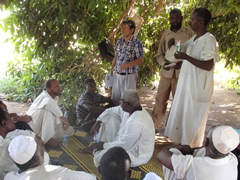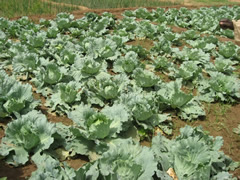- Home
- Technical Cooperation Projects
- Index of Countries
- Africa
- Sudan
- Capacity Development Project for Provision of the Services for Basic Human Needs in Kassala
- Project News
- Agriculture extension of horticulture crops and the role of "extension officers" in Kassala
Project News
2014-02-19
Agriculture extension of horticulture crops and the role of "extension officers" in Kassala
In general, an agriculture extension means to provide technical supports to farmers. Those who work for the agriculture extension are called "extension officers". Extension officers are expected to introduce new information such as new crops, varieties and techniques to farmers. Especially in developing countries, since farmers have few opportunities to collect information from outside, extension officer's roles are very important.
In Kassala, there are special cultivation techniques of horticulture crops which have developed through generations in its climate. Not all of traditional farming methods are unreasonable, and they must be respected. Through the accumulation of histories, cultivation techniques of horticulture crops in Kassala have developed to their own style.
Extension workers are required to pay attention to traditional farming techniques and, at the same time, to provide new information to farmers. This extension work must be careful enough to avoid farmers' confusion or hesitation. Some farmers may be interested in the new information and other farmers may not. Therefore, extension officers need to select farmers who are proactive to adopt new crops, varieties and techniques and precede the extension works to those farmers.
Normally, farmers tend to be afraid of the risk and be careful to adopt new techniques. If they fail in the production by applying new technologies, the compensation for their loss should be provided Thus, in order to extend new techniques, it is an essential condition to cover the initial cost (In K-TOP, the project made an agreement between farmers which indicates to pay back the initial cost in case of successful sales). Farmers are always pursuing their profits. Once farmers recognized that new crops, varieties and techniques make profit, they must leap at adopting that new information. Until farmers have such recognition, extension officers must encourage the farmers to maintain their motivation.
During my stay in Kassala, fortunately, we found that summer cropping of cabbage production made sufficient profit for farmers. Basically, a cabbage is recognized as a winter crop, and it is suitable to produce in cold climate. I believe that no one in Kassala thought the cabbage is able to cultivate in hot season. During the summer season, I observed a low quality cabbage from the mountainous area in Eritrea, where has colder climate, was sold in 20 Sudanese Pounds. Here, an inspiration of business opportunity hit me. In Kassala, if we can produce higher quality and fresher cabbages than those from Eritrea, it must make sufficient profit.
In order to cultivate a cabbage in hot season, the introduction of better variety and technique was necessary. Based on the past experience, I decided to introduce a heat tolerant variety. However, Sudan is the severely hot place which has no highlands and its temperature will be about 50 degree from April to June. Nobody believes that the cabbage production in summer is possible until the trial. Fortunately, I could meet cooperative farmers and we could start the demonstration farming. I deeply appreciate those farmers and extension officers who proactively cooperated.
The demonstration farming was conducted from spring to summer in 2012 and 2013. Overcoming difficulties, cabbages had grown in the hottest season from April to June, and it was proved that high quality cabbages can be cultivated in July and August. At the same time, the existing variety which was demonstrated as comparison died during the growing process. These results showed the advantage of new variety, and farmers could earn profit by selling the cabbages in the market. As a result, neighboring farmers became also interested in the summer cropping of cabbages, and it reached to practical extension in 2014.
Always I believe in "extension works by the farmers for the farmers to the farmers", and have conducted activities based on this belief. From this work, my belief became much stronger. Not only extension officers and researchers but also persons who work for agricultural cooperation must humbly accept the fact: how much the impact of proven profit by farmers can affect the other surrounding farmers.
From the experience in Kassala, I consider that the extension of agriculture techniques means "to lead farmers to make profit by agriculture production". A new technique will be extended only when farmers finally believe the goodness of new techniques, through demonstrations by farmers, that the technique introduced by extension officers can make more profit. Farmers' proof is stronger than any other famous scholars. I do believe that if introducing new crops, varieties and techniques can attain the farmers' goal, earning more profit, those new techniques will be sustainably diffused to others
(Reported by Mr. Junnosuke Harada, JICA Expert on Horticulture)
 Field day (a part of extension works)
Field day (a part of extension works)
 Cabbage production as newly introduced crop (ready for harvest)
Cabbage production as newly introduced crop (ready for harvest)
- About JICA
- News & Features
- Countries & Regions
- Our Work
- Thematic Issues
- Types of Assistance
- Partnerships with Other Development Partners
- Climate Change / Environmental and Social Considerations
- Evaluations
- Compliance and Anti-corruption
- Science and Technology Cooperation on Global Issues
- Research
- JICA Development Studies Program / JICA Chair
- Support for the Acceptance of Foreign HRs / Multicultural and Inclusive Community
- Publications
- Investor Relations
